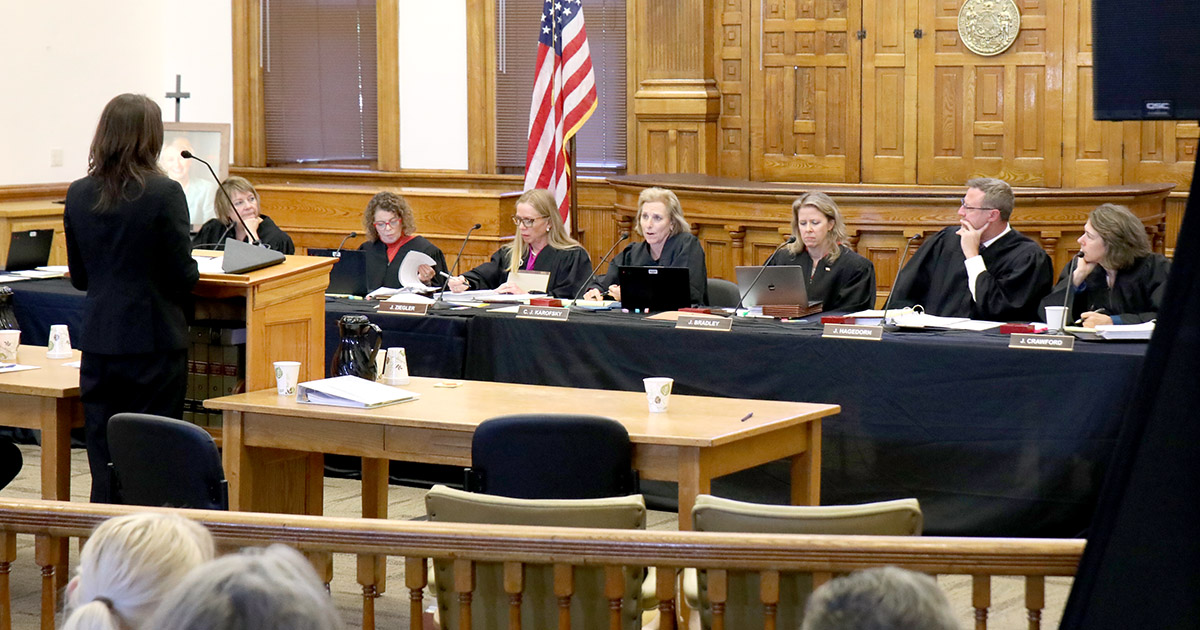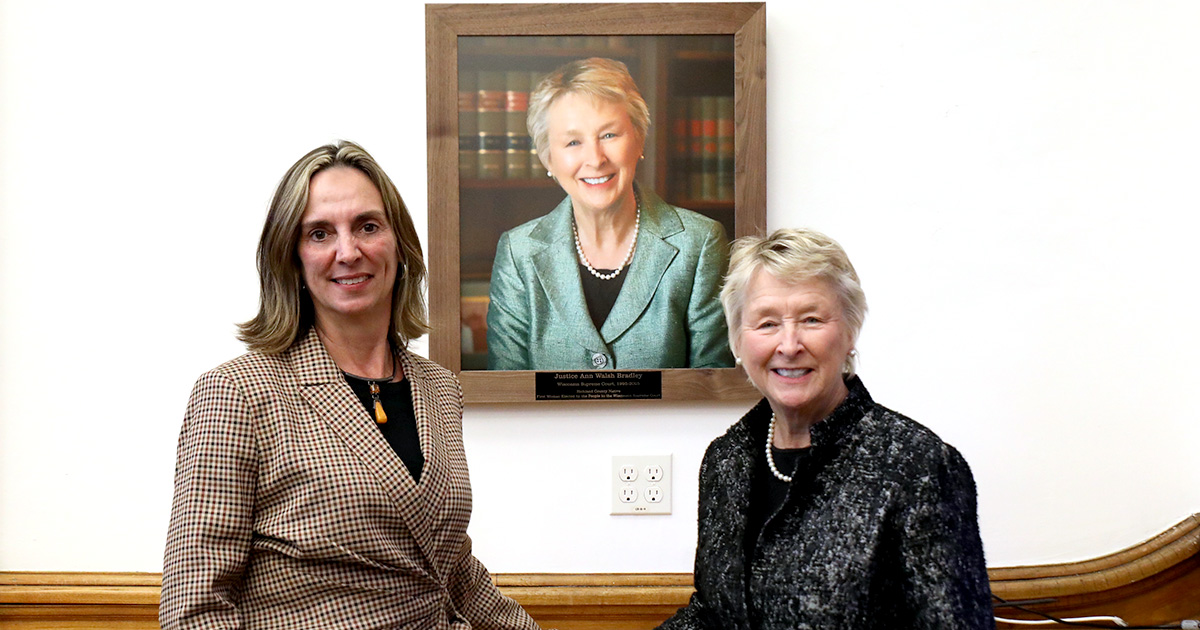This article was updated at 4 p.m. on Nov. 5, 2025, to make a correction. The article originally stated the last Justice on Wheels program was held in 2019. That was incorrect. The last program was held in 2022, in Waupaca County.
Nov. 5, 2025 – The Wisconsin Supreme Court commands silence from the audience during its oral argument hearings. But how do you command silence from an audience of nearly 100 elementary, middle, and high school students?
That was the scene last week at the Richland County Circuit Court, which hosted two oral arguments and other activities as part of the Wisconsin Supreme Court’s Justice on Wheels Program. The program, in existence since 1993, takes the court on the road and gives people outside Madison a chance to see it in action during oral arguments.
And the students were on their best behavior. They listened quietly, phones turned off and put away as ordered by the marshal, as the Court did its usual business – something very new to these students. It was a rare opportunity to watch the Court in action.
The last time the Wisconsin Supreme Court ventured out from its Capitol Courtroom in Madison was 2022, in Waupaca County. The Justice on Wheels program has visited more than 30 locations since 1993.
 Shannon Green is communications writer for the State Bar of Wisconsin, Madison. She can be reached by
email or by phone at (608) 250-6135.
Shannon Green is communications writer for the State Bar of Wisconsin, Madison. She can be reached by
email or by phone at (608) 250-6135.
On Oct. 27, 2025, the Court traveled to Richland County Courthouse in Richland Center in southwest Wisconsin.
The location was chosen purposefully: To honor and celebrate the career of now-retired Chief Justice Ann Walsh Bradley, a native of the area and whose legal career began there.
Chief Justice A.W.
Bradley retired July 31, 2025, after three decades of service on the Supreme Court. Prior to the hearings, a portrait and plaque were presented to her by Chief Justice Jill Karofsky. The portrait was taken by local photographer and attorney Tatiana Shirasaki, and provided by the State Bar of Wisconsin.
“While on the Court, she participated in more than 2,400 hearings and over 3,000 written decisions,” said Chief Justice Karofsky. “She helped shape Wisconsin law for three decades with intellect, fairness, and humanity.”
The portrait will stay on display in the courtroom.
The program also involved recognition of the winners of the Justice on Wheels Civics Contest. First-place winner Avah Fargen of Ithaca Elementary School and two runners-up, Sawyer Perkins and Lydia Hall of Kickapoo Elementary School, received awards from Justice Rebecca Dallet.
The two cases before the court,
Wren v. Columbia St. Mary’s Hospital Milwaukee, Inc. and
State v. K.R.C., will decide questions on a patient’s right to sue providers for malpractice during the COVID-19 shutdown in 2020, and the issue of
Miranda rights when a child is detained for questioning in the school building.
Retired Richland County Circuit Court Judge Andrew Sharp and local attorney Julie Dadoun each introduced the cases, helping students better understand the questions addressed.

Atty. Colleen Marion argues for the defense before the Supreme Court in State v. KRC.
Cases Before the Court
Wren v. Columbia St. Mary's Hospital Milwaukee, Inc. This case examines whether Wisconsin’s COVID-19 health care immunity statute, Wis. Stat. section 895.4801, violated the state constitutional right to a jury trial. Savannah Wren’s newborn son died in May 2020. Wren sued, alleging negligent medical care surrounding prenatal care and delivery.
The defendant, Columbia St. Mary’s, moved to dismiss, claiming statutory immunity under the COVID-19 health care immunity statute, which provided immunity from civil liability for death or injury to individuals if care was rendered during the COVID-19 state of emergency.
The circuit court granted the motion to dismiss, but the appeals court reversed. The Wisconsin Supreme Court was asked to decide if the COVID-19 immunity statute violated Wren’s constitutional right to a jury trial, because it barred her from a jury trial.
State v. K.R.C. In this case, the Wisconsin Supreme Court was asked to decide whether a 12-year-old boy, K.R.C., was considered “in custody” when a school resource officer and a detective interviewed him in a school conference room about suspected criminal activity.
Neither the officer nor the detective gave K.R.C.
Miranda warnings, which are constitutionally required when a suspect is in custody during interrogation. K.R.C. made incriminating statements and later moved to suppress them on constitutional grounds.
The circuit court denied the motion to suppress, finding K.R.C. was not “in custody” and the officers’ conduct was not coercive. The Court of Appeals affirmed, reasoning that a reasonable person in K.R.C.'s position would not have believed they were in custody, and that the interview environment did not rise to the level of coercion.

Former Chief Justice Ann Walsh Bradley and State Bar Executive Director Jill Rothstein pose for a photo with the new portrait of the former Chief Justice. Photos: Shannon Green.
